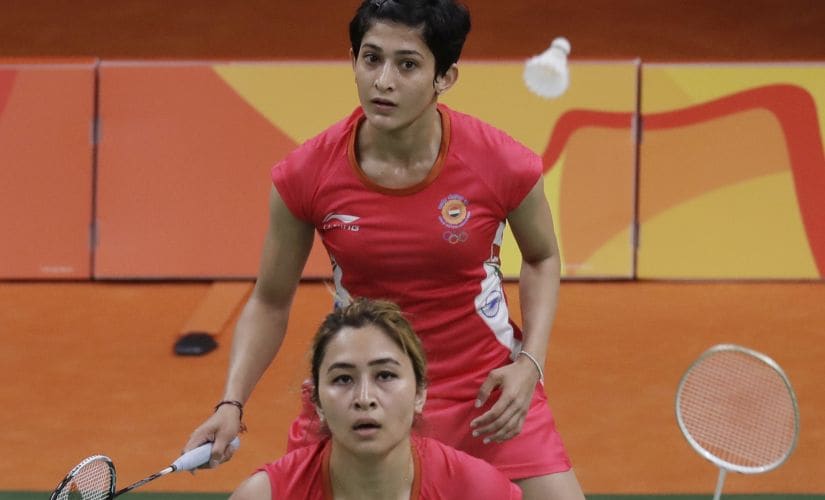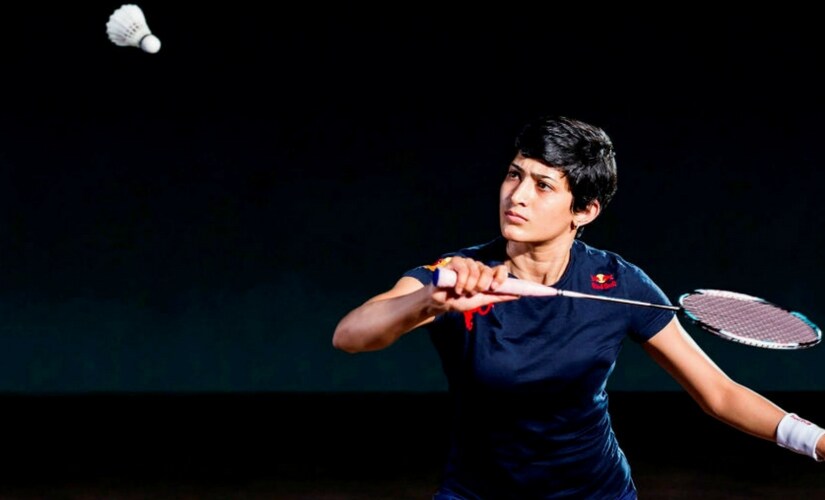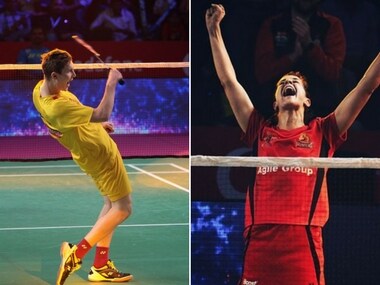In 2010, the then 21-year-old Ashwini Ponnappa alongside Jwala Gutta won India’s first-ever gold medal in Badminton at the Commonwealth Games after winning the India Open early that year.
The duo immediately followed it up with another accolade at the 2011 World Championships by becoming the only doubles pair from India to ever win a medal at the event.
After ending her partnership with Jwala in 2016, Ashwini went on to pair with young N Sikki Reddy to move on with her celebrated career in Indian badminton notching up impressive wins against top doubles pairs in the world.

File image of Jwala Gutta and Ashwini Ponappa in action. AP
Probably that is why her opinion on the step-motherly treatment meted out to the Indian doubles division holds high value.
“You are working against the system where even if you do really well, your performance is not highlighted, you don’t get as many sponsors as a singles player and if that’s the case what’s the motivation for youngsters to pick up doubles?” Ashwini asked concerned about the future that is in sight for the youngsters in the sport in an interview with Firstpost.
In December last year, in yet another brazen display of the apathy towards the doubles division by the powers in charge, the singles champions of the Junior National Badminton Champions were awarded with a car while the doubles champions had to be content with a cash award.
This move resulted in widespread backlash from both present and past doubles specialists from India.
Such disparaging moves could cloud the decisions made by the youngsters who are looking to excel in the sport and make the country proud.
Ashwini lamented about the present scenario among junior shuttlers and said, “Ask any junior if they want to take up doubles, they still want to take up singles if they had a chance. Because they have seen the kind of importance singles and doubles get.”
Despite doubles doing pretty well in the past couple of years, Ashwini, a Red Bull athlete, believes the focus is more on the defeats.
“The authorities constantly compare doubles to singles and if that's the case then we should have the same kind of support system, prize money and importance.”
The doubles division in Indian badminton has seen a resurgence of sorts with all three departments — mixed, men's and women's doubles — being well represented by rising stars.
The men’s doubles pairing of Sumeeth Reddy-Manu Attri and Satwiksairaj Rankireddy-Chirag Shetty have been impressing badminton connoisseurs with every successive tournament. The other mix-and-match pairings including Ashwini, Sikki and Pranaav Jerry Chopra have put the Indian doubles on an albeit slow but steady rise.
However, following the superlative performance of India’s singles players in 2017, the comparison with the doubles has become more pronounced.
“You can't really compare doubles with singles, they are two very different events. Most of us started off as singles players and later made the change to doubles. It's not like we voluntarily change to doubles. If it was a voluntarily choice then it would have been different situation,” said Ashwini.
This gap between the development of India’s singles and doubles divisions has also led to less representation of the doubles pairs in events like the recently concluded Premier Badminton League.
The number of foreign doubles pairs that played in the annual event was more than the number of Indian doubles players.
With the limelight solely focusing on the singles players, doubles is more often than not seen as a backup option if a player is unable to make a mark in the singles division.
Ashwini doesn’t believe this trend will be hard to curb unless the mindset of the people, media and the badminton association changes for the better.
Comparing Indian doubles pairs to the ones in countries like China and Japan, the 28-year-old said, “It’s not like this in other countries, you are motivated to take up doubles and do very well in it. If you are a doubles winner you are given as much importance as a singles player.”
Having been a torchbearer for doubles in India for almost a decade now, Ashwini has not only seen Indian badminton’s landscape change over the years, but has also witnessed a sea of change in her own style of play.

Ashwini Ponnappa and Sikki Reddy in action. Twitter: @sikkireddy
After her successful partnership with Jwala came to an end in 2016, she has been playing the women’s doubles with India’s rising star, Sikki, who also plies her wares in the mixed doubles division.
The duo’s 11-month journey so far has been a mixed bag with both good and bad performances.
Though Sikki, like Jwala, is a left-hander, Ashwini had to make quite a number of changes in her style of play.
“Initially I thought we’ll play the way Jwala and I played — she moving into the net a lot and me trying to pull out — but that didn’t work out. I move into the net and she pulls out and then she moves into the net and I pull out. My role is different as I am a little more experienced,” said Ashwini talking about the difference in playing with the two southpaws.
The past year also saw Ashwini making her foray into mixed doubles that she feels has helped her make improvements to her game.
“Playing mixed doubles has been a confidence booster. I have been training for it the whole of last year and I can see the difference it's made to my net game. I have a better idea of where the shuttle is going to come from and where it has to be played. In the past, I never got into that area of thinking because Jwala was so good. It's been a learning process combining with these players.”
Unlike earlier times where the doubles pairings were decided by the players, the presence of doubles specialist coach Tan Kim Her has effectively done away with this process.
“Jwala asked me whether I would play with her. I was quite young then and that’s how I decided with the help of another coach. Now that we have Tan, he is the one who is deciding.”
Though Ashwini initially had doubts about the pairing decisions made by the Malaysian coach, she got around to trusting Tan and is now happy with the partners he chose for her.
Having played with her respective women’s doubles and mixed doubles partners over the past year, she looks quite settled with the combinations and is looking forward to the 2018 season that clearly seems to be ready to throw up quite a few challenges.
The packed schedule of the 2018 calendar has found a number of detractors including top players like Viktor Axelsen, Carolina Marin and Saina Nehwal.
With the Commonwealth Games and Asian Games also taking place in 2018, the Indian shuttlers are bound to find the scheduling of tournaments very hectic.
However, Ashwini was one of the players who backed the BWF calendar and felt that the packed schedule is a part of the sport and it looks cramped because of the CWG and Asian Games this year.
She also felt that the top players, especially in the top-10 have the luxury of choosing matches unlike others.

File image of Ashwini Ponnappa. Image courtesy: Red Bull
Talking on a personal level, Ashwini said, “Doubles is yet to pick on and get to the top. For that, it's important for us to take on more tournaments, because playing more tournaments gives you more match exposure at the top level.”
After becoming the only doubles pair from India (with Jwala) to win a gold at the Commonwealth Games, Ashwini followed it up with a Silver at the 2014 games in Glasgow.
In 2018, Ashwini returns to her favourite hunting ground with a new pairing at the event that is scheduled to start on 4 April at Gold Coast, Australia.
From being the junior player in a successful doubles pair to now becoming the senior-most player in the doubles division, a lot has changed in the last eight years for the World No 24, who hopes to turn the spotlight over the Indian doubles division this year.
“I am taking more charge of situations now, whether it is filling my partners in, to be supportive, guiding them and I am always listening. I have more experience than they do so I am enjoying my new role. Definitely winning a medal at the Commonwealth Games will be one of the important targets.”
Published Date: Jan 28, 2018 19:44 PM | Updated Date: Jan 28, 2018 19:44 PM



















